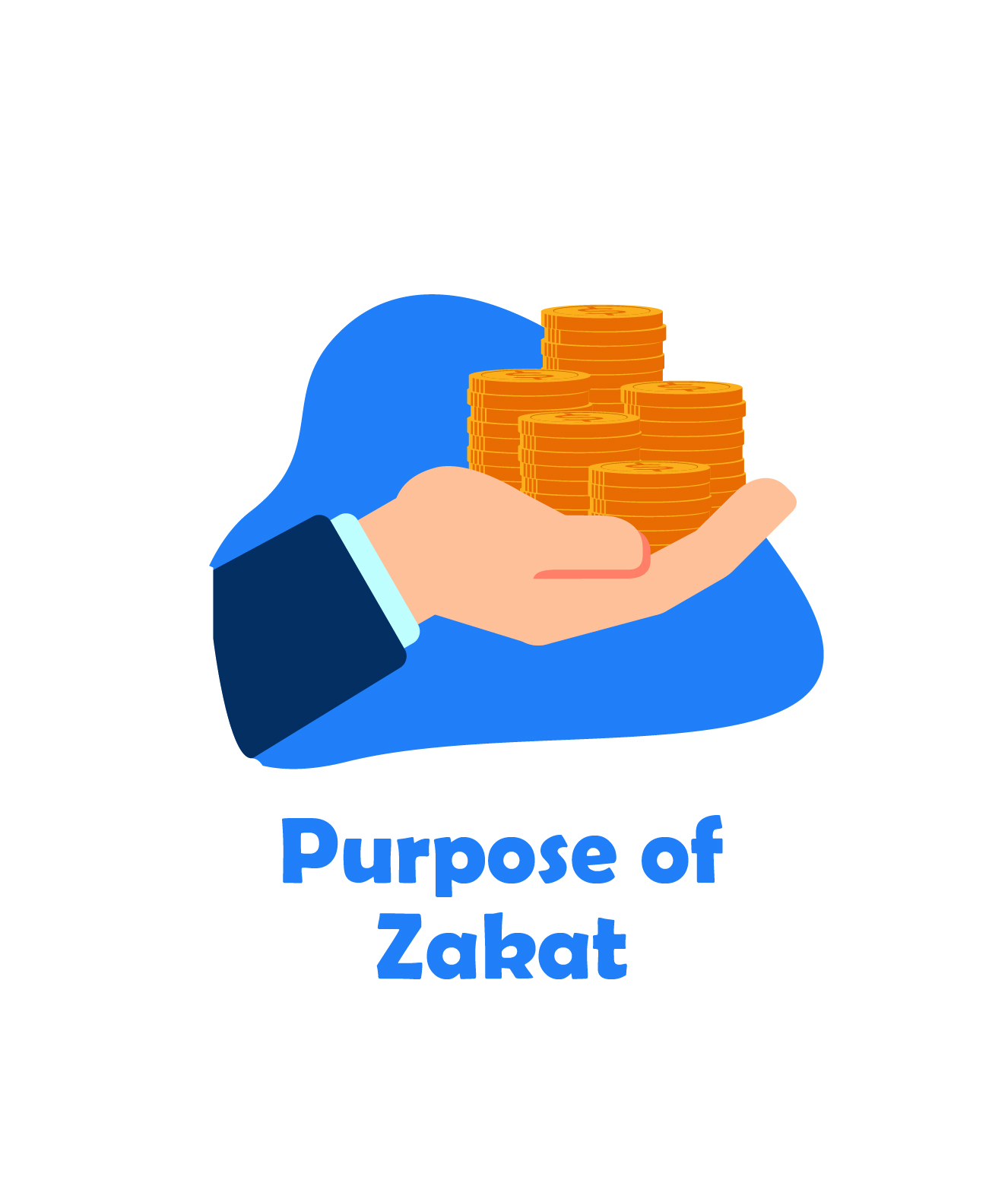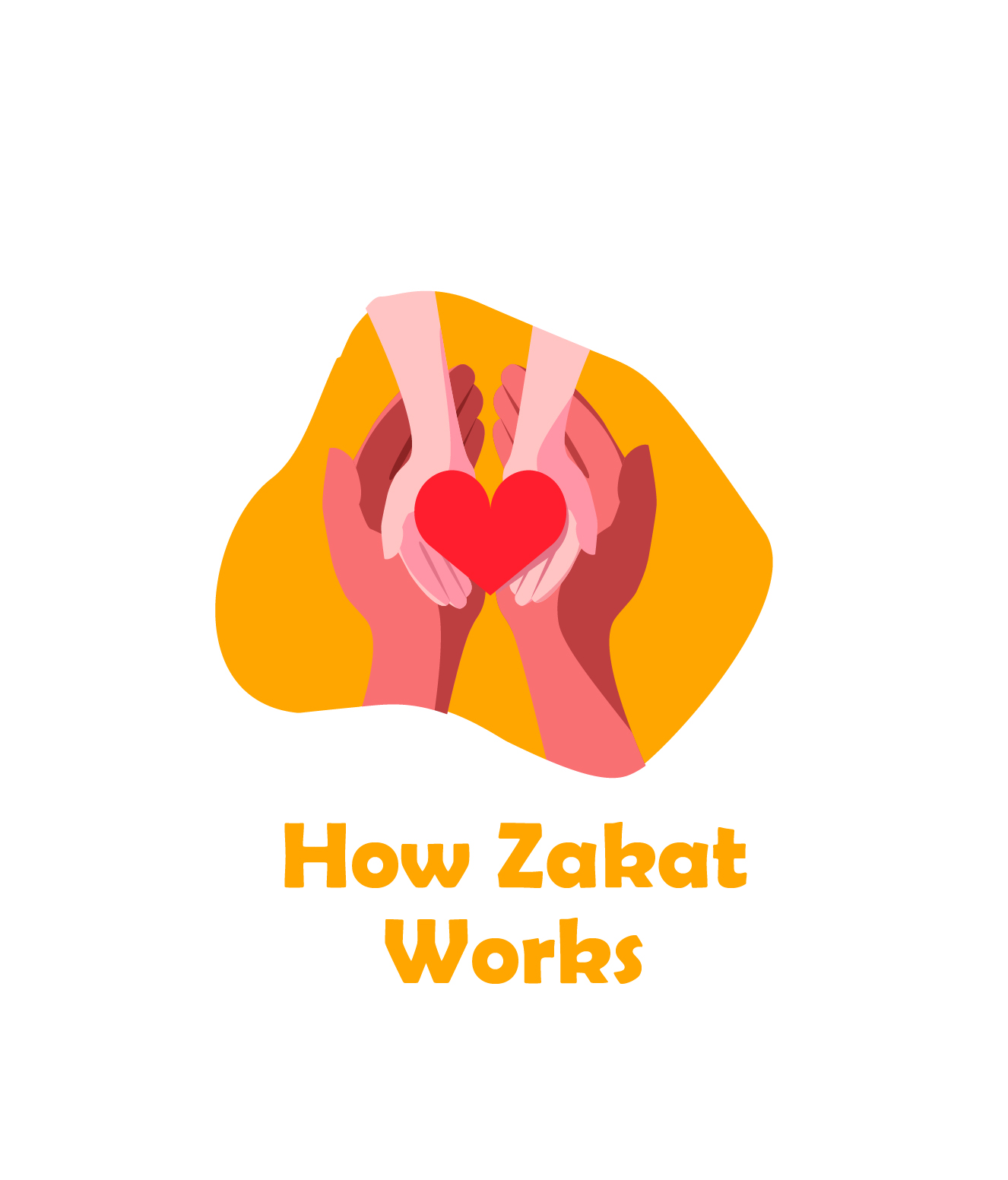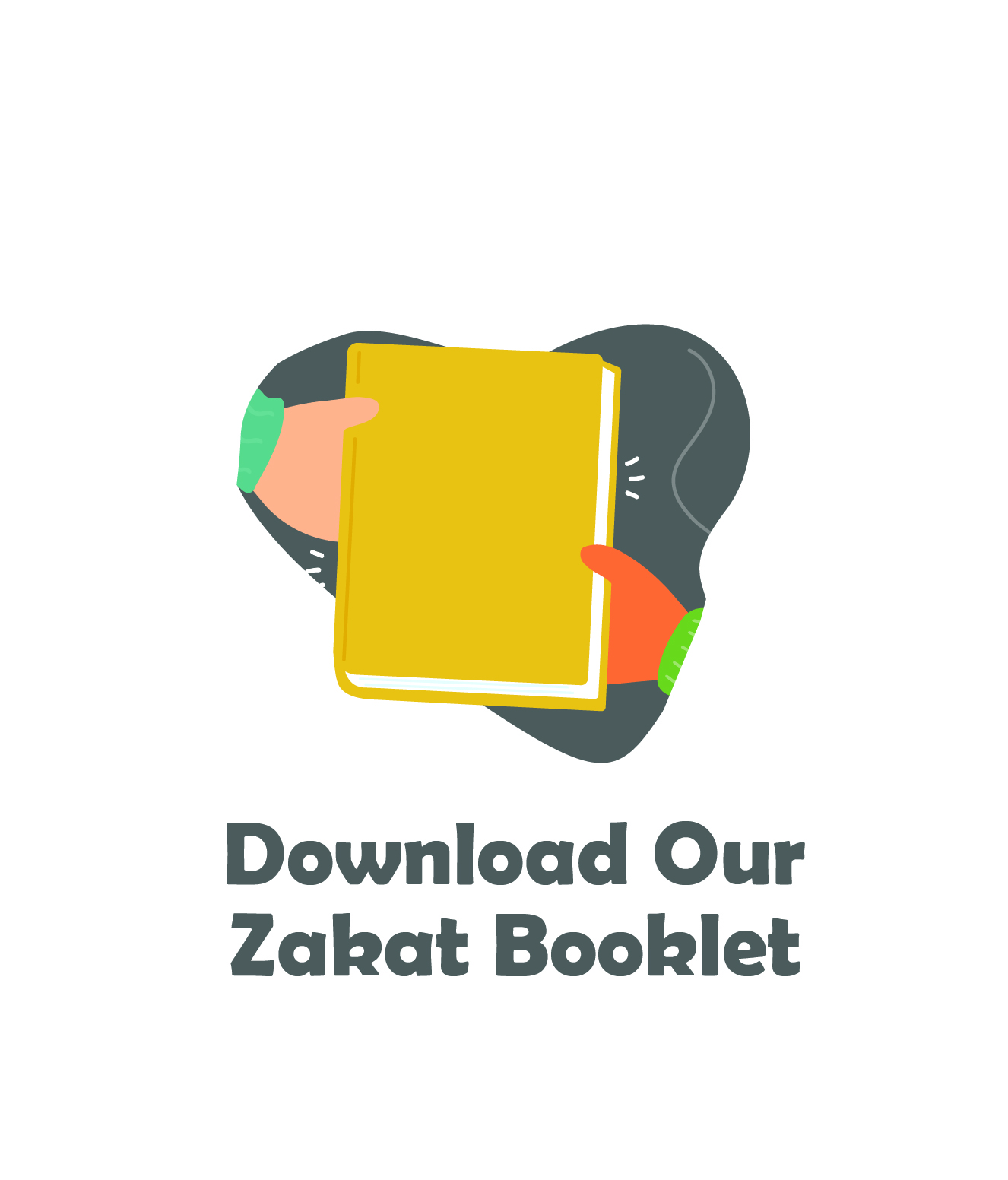
1What is Zakat?
In Lisan al-Arab, it says, “The root of the word zakat in Arabic means cleanliness, growth, blessing and praise. All these meanings of the word are used in the Quran and hadith”.
In the Shari’a the word zakat refers to the determined share of wealth prescribed by Allah to be distributed among the categories of those entitled to receive it. It is also used to mean the action of payment of this share. Growth and cleanliness are not restricted to the assets from which zakat has been taken, but affects the person who pays zakat, in accordance with the verse, “Take zakat from their wealth to purify and cleanse them.” (9:103). Zakat creates psychological and material growth for the rich in his soul and wealth.
Zakat is the fourth pillar of Islam and is an ibadah in terms of wealth. It is an obligatory charity, as a duty to Allah. If a person has met the conditions, then it is obligatory for the person to pay zakat.
In the Shari’a the word zakat refers to the determined share of wealth prescribed by Allah to be distributed among the categories of those entitled to receive it. It is also used to mean the action of payment of this share. Growth and cleanliness are not restricted to the assets from which zakat has been taken, but affects the person who pays zakat, in accordance with the verse, “Take zakat from their wealth to purify and cleanse them.” (9:103). Zakat creates psychological and material growth for the rich in his soul and wealth.
Zakat is the fourth pillar of Islam and is an ibadah in terms of wealth. It is an obligatory charity, as a duty to Allah. If a person has met the conditions, then it is obligatory for the person to pay zakat.
2Who should pay Zakat?
Zakat is obligatory on every man or a woman who is an adult, of sane mind and has met the following conditions:
a) Nisab – the person’s wealth at any point in time in the hijrah year must be above nisab, which is equivalent to the market value of 86g of gold. (Please refer to MUIS website for the nisab in amount ($))
b) Haul – the wealth above nisab must be with the person for at least one hijrah year.
c) Muslim – zakat is only applicable to Muslim.
d) Full ownership – the person must have full ownership of the wealth.
The responsibility is to be discharged by everyone based upon his/her situation and value of wealth the individual possesses.
a) Nisab – the person’s wealth at any point in time in the hijrah year must be above nisab, which is equivalent to the market value of 86g of gold. (Please refer to MUIS website for the nisab in amount ($))
b) Haul – the wealth above nisab must be with the person for at least one hijrah year.
c) Muslim – zakat is only applicable to Muslim.
d) Full ownership – the person must have full ownership of the wealth.
The responsibility is to be discharged by everyone based upon his/her situation and value of wealth the individual possesses.
3Is Zakat required from non-Muslims?
Zakat is an obligation of Islam. It is not required from non-Muslims because it is a part of the religion and could not be expected from those not believing in Islam. By the same token, zakat will not be considered due for the past period of disbelief of a person who converts to Islam.
4What are the advantages of paying Zakat?
For the individual, it cleanses the rest of the assets and the heart as it brings about a sense of peace and well being.
It will rid the society of feelings of miserliness, selfishness, greed, and materialism and replace them with higher qualities of generosity, love and care and mutual help.
For those who receive assistance from zakat, it reduces their economic burden, and they can pay attention to the family, social and spiritual aspects of their lives. It also cleanses jealousy and hatred.
For those who receive assistance from zakat, it reduces their economic burden, and they can pay attention to the family, social and spiritual aspects of their lives. It also cleanses jealousy and hatred.
5What are the types of assets whereby Zakat is payable?
In Singapore, the most commonly assets whereby zakat is payable are:
a) savings
b) shares
c) gold
d) business
e) CPF savings
a) savings
b) shares
c) gold
d) business
e) CPF savings
6What are the ways of calculating Zakat?
The various types of zakat calculations are as follows:
a) Zakat savings:
- 2.5% from the lowest balance of one year of any types of savings when nisab is reached.
- 2.5% of the lowest monthly balance or every transaction.
- 2.5% from the last balance when nisab and haul is reached (following mazhab Hanafi).
b) Zakat shares:
It should be noted, however, that the value of the jewellery and ornaments is the criterion and not heir weight only, because craftsmanship contributes to the value of the jewellery. d) Zakat Business:
a) Zakat savings:
It should be noted, however, that the value of the jewellery and ornaments is the criterion and not heir weight only, because craftsmanship contributes to the value of the jewellery. d) Zakat Business:
7Should Zakat be paid in Ramadhan?
Most Muslims prefer to give their zakat in Ramadan because there are more rewards for doing so, but it is not necessary to pay zakat in this blessed month.
8Is Zakat payable on debts?
The majority of jurists since the era of the Companions distinguish between two kinds of debts. The first are debts which creditors expect to be repaid, meaning debts made to parties who are capable of payment. Zakat is obliged on this category of debts yearly, as if they were property under control. The second are doubtful or dead debts, which are debts on individuals who are incapable of repayment or are denied by debtors.
There are three views about zakat on these debts. The first is that the creditor must pay zakat for all past years upon repayment of the debt. The second is that the creditor should pay zakat for the last year only upon repayment of the debt. The third is that the creditor does not owe any zakat whatsoever and the debt when paid back starts a new year of zakat.
Today, contemporary Islamic Scholars adopt this third view, as the creditor is not in the position or control of the money/credit to make use of it for investment, business or even to spend for his own need.
There are three views about zakat on these debts. The first is that the creditor must pay zakat for all past years upon repayment of the debt. The second is that the creditor should pay zakat for the last year only upon repayment of the debt. The third is that the creditor does not owe any zakat whatsoever and the debt when paid back starts a new year of zakat.
Today, contemporary Islamic Scholars adopt this third view, as the creditor is not in the position or control of the money/credit to make use of it for investment, business or even to spend for his own need.
9Who is eligible to receive Zakat?
The Quran specifies eight (8) purposes for which the money from zakat can be used. They are the following:
1. Muallaf
Muallaf are those whose hearts are inclined towards Islam.
2. Fakir
A person without any means to sustain his daily needs.
3. Miskin
A person with insufficient means to sustain his daily needs.
4. Riqab
A person who needs assistance to pursue his education.
5. Gharimin
A person in debt who needs assistance to meet his basic needs.
6. Fisabilillah
A person who strives for the cause of Allah, for the community.
7. Ibnussabil
A stranded traveller on a permissible journey.
8. ‘Amil
Administrators of Zakat.
1. Muallaf
Muallaf are those whose hearts are inclined towards Islam.
2. Fakir
A person without any means to sustain his daily needs.
3. Miskin
A person with insufficient means to sustain his daily needs.
4. Riqab
A person who needs assistance to pursue his education.
5. Gharimin
A person in debt who needs assistance to meet his basic needs.
6. Fisabilillah
A person who strives for the cause of Allah, for the community.
7. Ibnussabil
A stranded traveller on a permissible journey.
8. ‘Amil
Administrators of Zakat.
10Can relatives receive Zakat?
Yes, provided they are not the dependents, such as wife and children, and parents (including ascendants grand parents and descendents such as grand children). Beyond these relatives, in fact it would be preferred that one gives zakat to one’s relatives first. A wealthy wife can give zakat to her poor husband and not the other way around.
11Is it allowed for a person to give his Zakat to his own mother?
A Muslim may not give his zakat to his parents or to his children. But, in fact, it is obligatory upon him to spend on their behalf from his own wealth if they need it and he has the ability to spend on their behalf.
12Is it allowed for my husband to pay zakat on my wealth on my behalf, given that he is the one who gave me the wealth?
Zakat is obligatory upon your wealth, if you have the nisab or more of gold, silver or other forms of zakatable wealth. If your husband, with your permission, pays it for you there is no harm. The same is true if your father, brother or others, with your permission, pay it on your behalf.
13What are the principles for the disbursement of zakat?
Some of the principles for the disbursement of zakat include:
a) Zakat can only be collected from and distributed among Muslims.
b) Relatives (father, mother, son, daughter, husband and wife) one who is bound to support in accordance with the Shari’a are not entitled to receive zakat. However, relatives should be given preference over non-relatives.
c) Ordinarily, the zakat in a township should be distributed among its own inhabitants. If, however, deserving people are not available, zakat can be given to people in another settlement in emergencies: floods, earthquakes, etc.
d) Zakat payers should satisfy themselves that the recipients are genuinely deserved individuals.
e) Goods of necessity can also be purchased from zakat money.
f) It is not necessary to inform the recipients that the money or goods being given to them is zakat.
a) Zakat can only be collected from and distributed among Muslims.
b) Relatives (father, mother, son, daughter, husband and wife) one who is bound to support in accordance with the Shari’a are not entitled to receive zakat. However, relatives should be given preference over non-relatives.
c) Ordinarily, the zakat in a township should be distributed among its own inhabitants. If, however, deserving people are not available, zakat can be given to people in another settlement in emergencies: floods, earthquakes, etc.
d) Zakat payers should satisfy themselves that the recipients are genuinely deserved individuals.
e) Goods of necessity can also be purchased from zakat money.
f) It is not necessary to inform the recipients that the money or goods being given to them is zakat.
14What is the punishment for not paying zakat?
Al-Bukhari reported from Abu Hurayra,
“The Messenger of Allah (p) said, ‘If someone is given wealth by Allah but does not pay its zakat, that wealth will appear to him on the Day of Judgement in the form of a huge bald serpent with two horns, encircling him and squeezing him all day, then holding him by the lips and telling him, ‘I am your wealth, your treasure which you hoarded.’ Then the Prophet quoted the verse, ‘Those who are stingy with the bounty Allah has given them should not suppose that that is better for them. No indeed, it is worse for him! What they were stingy with will be hung around their necks on the Day of Rising.’ (3:180)”
According al-Mundhiri, whenever zakat is not paid, it will be a cause of ruining that wealth. If someone receives zakat without being entitled to it and mixes it with his wealth, that will be a reason for rotting all his wealth, according to Imam Ahmad. (At-Targhib wa’t-Tarhib).
“The Messenger of Allah (p) said, ‘If someone is given wealth by Allah but does not pay its zakat, that wealth will appear to him on the Day of Judgement in the form of a huge bald serpent with two horns, encircling him and squeezing him all day, then holding him by the lips and telling him, ‘I am your wealth, your treasure which you hoarded.’ Then the Prophet quoted the verse, ‘Those who are stingy with the bounty Allah has given them should not suppose that that is better for them. No indeed, it is worse for him! What they were stingy with will be hung around their necks on the Day of Rising.’ (3:180)”
According al-Mundhiri, whenever zakat is not paid, it will be a cause of ruining that wealth. If someone receives zakat without being entitled to it and mixes it with his wealth, that will be a reason for rotting all his wealth, according to Imam Ahmad. (At-Targhib wa’t-Tarhib).
15Who are the categories of people to whom zakat must not be given?
The rich.
Those capable of earning enough for their monthly needs.
Disbelievers and apostates who fight against Islam.
The children, parents, and wives of zakat payers.
Descendants of the Prophet.
Those capable of earning enough for their monthly needs.
Disbelievers and apostates who fight against Islam.
The children, parents, and wives of zakat payers.
Descendants of the Prophet.
16Is MCAS under the Zakat IRAS Auto-Inclusion Scheme?
Zakat contribution will not be auto included in your tax return. However, we are a registered charity, and you are still eligible to claim your Zakat as tax deductible.
17How do I declare my Zakat contribution in my tax submission?
You will have to follow the steps below to claim for tax deduction for Year of Assessment:
1. Go to my Tax Portal
2. Start to e-file
3. You will be able to see your income & expenditure
4. For amendments (in this case to add the Zakat), click the button ‘Continue to Main Tax Form’
5. You will be able to add under the employment expenses (Note: You can only key in the amount)
1. Go to my Tax Portal
2. Start to e-file
3. You will be able to see your income & expenditure
4. For amendments (in this case to add the Zakat), click the button ‘Continue to Main Tax Form’
5. You will be able to add under the employment expenses (Note: You can only key in the amount)




